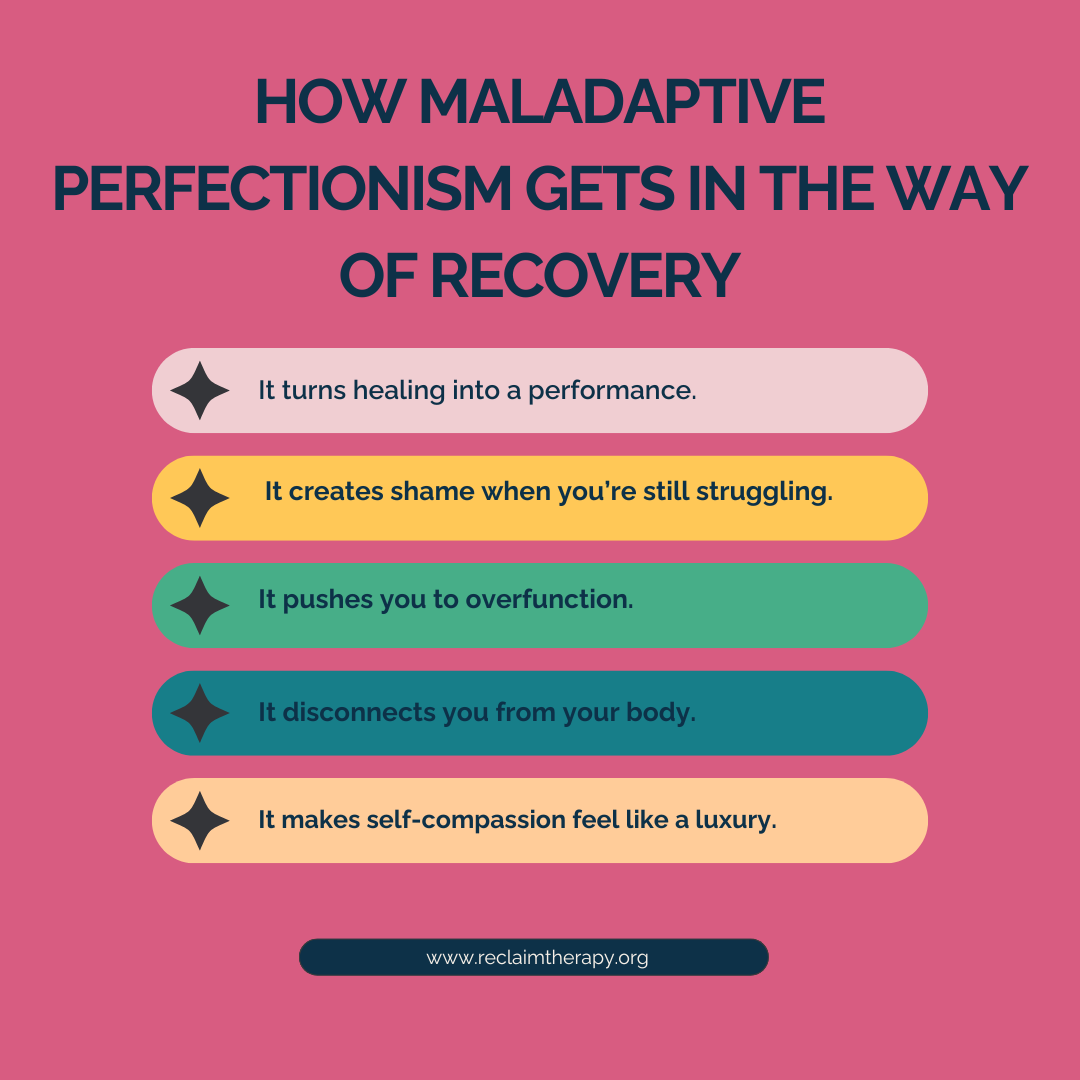What I Thought Healing Would Be (Thanks, Maladaptive Perfectionism)
Let’s be real: maladaptive perfectionism is like that mother-in-law who shows up uninvited and starts reorganizing your kitchen.
At first, it seems helpful. Motivating, even. You tell yourself, “Well… she means well.”
But next thing you know, everything’s in a “better” place… and you can’t find a damn thing anymore.
That’s what perfectionism does to your healing.
It comes in hot with good intentions, starts rearranging everything, and leaves you completely disconnected from what you actually need.
Suddenly, you're obsessing over how “well” you're doing therapy. Shaming yourself for still struggling. Treating recovery like a full-time job, with zero PTO.
And if you’ve lived through emotional neglect, chronic pressure to perform, or the kind of trauma that never got named but shaped everything? Then you already know: perfectionism isn’t just about high standards. It’s about safety. Survival. Control.
And yup, it follows you straight into your healing.
When Perfectionism Becomes Manager of Your Recovery
There was a time I thought I had it all figured out. I’d show up to therapy with my journal in hand, a perfectly worded summary of my week, and three takeaways I thought my therapist would love. I wasn’t just doing the work, I was excelling at it.
Looking back?
I was trying to heal without ever letting myself be seen in the mess.
So, let’s get into it. Here’s what I thought healing would be, back when I still believed I had to earn my way out of pain, and what it actually looks like now that I’m learning to let go.
What I Thought Healing Would Be
At one point, I was completely convinced that healing from trauma would look something like this:
Waking up at 6am to walk, journal and meditate
Leaving every therapy session with a breakthrough
Eating intuitively with zero food noise
Never dissociating or shutting down again
Crying a few times, processing everything, and moving on
Talking about my trauma without feeling anything
Healing in a straight line with predictable progress
Getting metaphorical gold stars from my therapist
Feeling “normal” again, and fast
It wasn’t just a fantasy. It was a full-blown performance. I thought if I could just do healing the way it should look, I’d never have to feel unsafe or ashamed again.
But perfectionism is all that safe. It’s just another form of control.
The Impact of Fear of Failure
If there’s one thing that keeps perfectionists stuck, it’s the fear of failure. For many of us, this fear isn’t just a passing worry—it’s a constant, heavy presence that shapes every decision and reaction. When you’re caught in maladaptive perfectionism, the drive to avoid mistakes can become an obsession, leading to an excessive preoccupation with achieving perfection in every area of daily life.
This intense fear of failure often means setting unrealistic expectations and standards for yourself. The result? A cycle of self criticism, self blame, and low self esteem that’s hard to break. Perfectionists tend to become highly self critical, convinced that anything less than perfect is unacceptable. The pressure to meet your own expectations can be overwhelming, and when you inevitably fall short, it’s easy to spiral into negative emotions like anxiety, shame, or even depressive symptoms.
Maladaptive perfectionists often find themselves avoiding tasks altogether, paralyzed by the belief that if they can’t do something perfectly, it’s better not to try at all. This avoidance isn’t laziness—it’s a protective strategy against the pain of perceived failure. Over time, this can negatively impact mental health, leading to significant distress and even contributing to mental health conditions like anxiety disorders, obsessive compulsive disorder, and eating disorders such as anorexia nervosa.
It’s important to remember that not all perfectionism is harmful. Healthy perfectionists—those with adaptive perfectionism—are able to strive for excellence without being overly self critical. They see mistakes as part of the learning process, set realistic expectations, and allow themselves room to grow. Adaptive perfectionism can be a positive trait, helping you achieve goals and build self esteem without the constant pressure and negative aspects that come with maladaptive perfectionism.
But for maladaptive perfectionists, the combination of intense fear of failure, chronic stress, and excessively high expectations can be exhausting. These perfectionistic tendencies are shaped by a mix of individual personality traits (like those in the big five personality traits), parental practices, and even cultural factors that reward achievement above all else. Constant exposure to these influences can reinforce the belief that your worth is tied to your ability to achieve perfection.
The good news? You can overcome maladaptive perfectionism. Working with a mental health professional—someone who understands the nuances of clinical psychology—can help you develop coping strategies, like cognitive behavioral therapy, to challenge unrealistic goals and build self compassion. Research suggests that learning to be kinder to yourself, setting more realistic expectations, and accepting that mistakes are part of growth can lead to positive outcomes and a healthier relationship with achievement.
Healing from maladaptive perfectionism isn’t about never feeling fear again. It’s about learning to move forward anyway, with a little more gentleness and a lot less self criticism. And that, in itself, is a powerful step toward real recovery.
What Healing Actually Looks Like: Letting Go of Expectations
The real healing? It’s slower. Quieter. More sacred than I expected. And yes, much messier.
Some days I feel grounded and present. Other days I dissociate in the middle of making dinner and have to remind myself I’m okay. Both count.
Here’s a taste of what it actually looks like:
Still waking up anxious, and offering myself softness instead of shame
Missing therapy and not spiraling about it
Letting rest count as progress, not failure
Relearning the same lesson for the hundredth time
Crying in random places and letting that be okay
Pausing mid-trigger and whispering, “I’m still here”
Accepting that some things heal slowly, and that’s not a problem
Practicing presence, not performance
Letting myself be witnessed without being polished
Real healing isn’t about doing it right. It’s about learning how to stay with yourself when it’s hard.
How Adaptive and Maladaptive Perfectionism Get in the Way of Recovery
Let’s pause and name this clearly: maladaptive perfectionism is a trauma response.
It’s not a personality flaw or a motivational quirk.
It’s what happens when your nervous system decides that being perfect is the only way to stay safe.
And when it seeps into your healing, it can truly sabotage the entire process.
Here’s how:
1. It turns healing into a performance.
You’re focused on appearing “better” instead of actually feeling better. You worry more about what your therapist thinks than what your body needs.
2. It creates shame when you’re still struggling.
Every setback feels like proof that you’re failing. Even normal dysregulation becomes something to “fix.”
3. It pushes you to overfunction.
You try to heal through effort and overthinking, instead of slowing down enough to feel. Rest feels threatening.
4. It disconnects you from your body.
Healing becomes a mental checklist instead of a relational process with your nervous system.
5. It makes self-compassion feel like a luxury.
You can’t offer yourself kindness unless you’ve earned it. Spoiler: compassion is the work. It’s not optional.
So if healing feels hard, overwhelming, or like something you’re constantly doing “wrong” this might be what’s underneath it.
What I’m Practicing Now
I will never consider myself “perfectly” healed. I’m healing.
I still hear the perfectionist voice from time to time, especially when things feel out of control. But I’m learning and practicing how to pause. To soften. To remind myself that I’m already safe enough to be in process.
Here are a few things I’ve been practicing (with lots of room for do-overs):
Letting good enough actually be enough
Catching the inner overachiever before she takes the wheel
Choosing presence over performance
Giving myself permission to be seen in the mess
Measuring progress in micro-moments, not milestones
Resting even when it feels uncomfortable
Asking, “What part of me feels unsafe right now?” instead of “What’s wrong with me?”
You don’t have to be perfect to be healing. You just have to keep showing up, with your full, messy, magical humanity.
That’s where the real repair begins.
Want a Little Support Letting Go of the Pressure to Do It Perfectly?
We’ve create The “Good Enough Healing” Journal Kit
3 grounding questions to interrupt the inner overachiever
A short, body-based check-in you can do in 60 seconds
A self-compassion reframe to use when you feel like you're “failing” at healing
This isn’t about doing more. It’s about doing less with more presence.
Or if you’re ready to go deeper, we’re here to support you through that process.
At Reclaim Therapy, our team specializes in helping folks heal from trauma, perfectionism, and the survival strategies that once kept them safe, but are now keeping them stuck.
Whether you’re navigating complex PTSD, eating disorder recovery, or working to reconnect with your body in a way that actually feels safe, you're not alone.
Schedule your free consultation to day to get started with one of our trauma therapists!
🧡,




